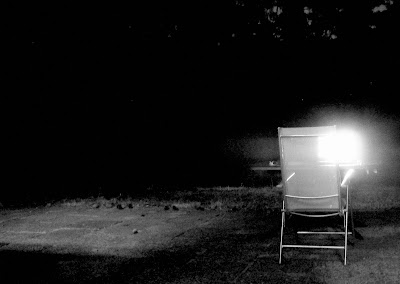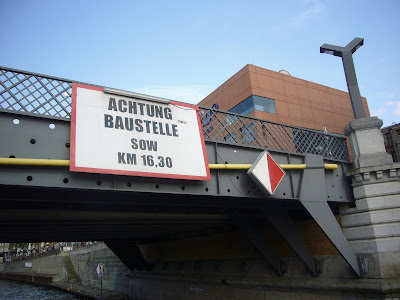25 June 2008
And so I lived a year in Berlin. The city has a place for everyone it seems, and with some time I cannot imagine anyone not feeling right in the city. It is impossible to say that I know the whole city, but I believe nobody can claim this, not even someone born and raised in Berlin. It is a city that is becoming, with every aspect changing, from its social make-up to the reconstruction of original architecture. New art forms ride on the constructive developments of the city, finding inspiration in the many changes. It is multi-layered, with underground scenes, metropole attitudes, neo-punk, immigrants, coffee culture,a heavy-laden past, electronic music, entirely different neighborhoods etc. Maybe I can say that I know some of these layers, the electronic clubscene, contemporary architecture, museums, parks, beergartens are all aspects which I tried to get to know properly. Nothing is really impressive, or shocking; it is all very real, actually quite friendly and open. Maybe I will return to the city at some point in my life, there is so much more; but within this year, I glimpsed somewhat of the whole in its many brilliant parts, and I am ready to go somewhere else.
Labels: Trips
15 June 2008
Berghain is a techno club, hidden behind storage buildings, housed in an an industrial communist-style building. The bouncer face is tattooed all over and his skin pierced. Everyone is frisked and cameras are too be handed in separately. Entering, you find yourself in a huge hallway, with pillars repeating off into dark space. Having passed the wardrobe, you walk the stairs and enter the spacious dancefloor, an underground universe reminiscent of the club scene in Blade. Naked men dance fiercely on the thumping beat of the electronic music, transvestites walk around fabulously. Freaks appear in their normality here. The dark dancing room splits off into numerable alleys, another floor, separate bars, darkrooms, sexchambers and metal walking bridges. I have seen the most creative DJs in this wonderful place, electronic music that can be felt in your stomach. I lost myself here in my weekends, solitude adventures, or sharing in ecstasy with friends. Berghain was my rabbit-hole into Berlin's nightlife. One never leaves before dawn, one never leaves without stupor. It is attractively kitsch, partly a show, partly real; but always a dream...
Labels: Trips
11 June 2008

Philosophy is quintessentially a journey. When we travel, when we make a true journey, we absorb the environment and experience a different world, we fuse with alterity, with the newness and the many differences that enstrange us from our past. Travelling is a metaphor for reading philosophy, because I enter into a new world entirely and experience everything differently. And I becomes different because of it. Are we not exactly that what we experience? The more I am becoming a philosopher, the less I have the urge to travel. A philosophy book is enough. Yet at the same time, I never truly leave myself when doing philosophy, I always remain within myself, I am always the one appropiating the new world, making the different thoughts my own, whatever that may mean...
{Fragment} My experience of a Nietzschean perspective:
Culture is permeated with oppositions, things of different nature clash with each other. There is a gap between oppositions, a nothingness. Humans are caught within this nothingness, in between all oppositions. For example, Good and Evil: are thought to be two wholly different things, an act is either Good or Evil. Or, Truth and Falsehood: there are things that change, they only appear as they they are and there is truth that is always the same, beyond appearance. Nietzsche undoes this opposition, brings the opposing elements into contact, revealing them to be of the same kind. They become mere points on the same scale, different values of the same variable. So, Good is what weak people use to restrain the strong, Evil becomes natural striving; good becomes evil, evil becomes good: they have become similar. And similarly, Truth is used conserve the old, it is dogmatic and denies real life while Falsehood is the origin of creativity and everything new; truth become false, false becomes true to life and growth. We should strive but we should not strive for that which denies life, we should strive to go beyond ourselves without making the 'beyond' other-wordly. Life does not know oppositions.
{Fragment} My experience of a Hegelian perspective:
The subject becomes only properly a self-conscious person when it is opposed by something hidden, something unlike one-self, a non-I, an object. The self receives its first delineation, its first definition from its difference to an other, the other opens up the possibility for the subject being reflected back unto itself and thereby gains self-consciousness. However, often the object will actually also be a human being, resulting in a clash of wills, of desires, of the need for recognition.
These are just fragments, two examples of the experiences I wander through. I see these things everywhere around me. But they are not at all Nietzsche or Hegel, they are my experience of them. I have appropiated them, made their thoughts my own while bringing my own thoughts to them. They are not fully interpretations, they are also inspirations. The fragments are hybrids. But in the end, I mainly see myself in the experiences, my personal problems and my questions of life. Thus I am doing myself, I am reading myself. I get so sick of myself. The "I" is lurking behind every experience. I cannot get out of myself. Everything other becomes me. For a short moment the world becomes Nietzschean or Hegelian, it is my real relieve, my drug; but soon enough I recognize my doings in the adaptation, my own self that directs the misinterpretation. But I do not want to be the God of my experience. I do not want it at all. I do not want to be omnipresent. I do not want to be locked in myself. I do not want to have to distance myself from things, in order not to destroy them. It is lonely. It is perverse. It is boring. And the more I think, the more I turn everything into myself, the more I overcome my oppositions, the more I grow, the lonelier I become.
Labels: Thoughts
08 June 2008
In order to be self-consciousness, you need to have inner divisions. There is a seed of schizophrenia in every rational being. There need to be parts for there to be analysis, there need to be elements for there to be complexity. There needs to be presentation and representation. There needs to be an opposition between subject and object. There needs to be recognition and denial. For there to be introspection, a space needs open, an opening created by opposing layers of differences.
Two such, necessarily opposing voices speak:
One a hermit, critical and always distancing itself from life. It wants reclusion, it wants to be higher than the rest, where things are quiet and one can see far and wide. It hates everything bourgeois, it detests all group behavior. Beyond morality it says whatever it want to say, always true to itself. It does not want to adapt. It is the voice of the loner, only happy when it can hear itself, only happy when it is moving. It shuns ugliness and boredom. It avoids everything stupid. The will speaks unmediated, unfiltered. Always learning, the hermit is always improving, always on the search for beauty. And through its desires, individuality crystallizes. - The other, its counter-voice, is the voice of the clown. The clown wants to associate with people, support its family, make friends and spread happiness. It is down-to-earth, yet able to smile about life. Nothing is wholly serious to the clown, everything is a game in the end, with rules and other players. Nothing is wholly real. Adaptation is its mastery, irony its attitude. Always curious where the game may lead to, it wants to bind, to settle and find stability to built on. It wants to play at the next level. It wants to be like others. Nobody knows when it mimics other people and when it doesn't. But everyone knows it is the sociable, the voice to talk to.
"I hate you", says the one.
"Don't be so pathetic", says the other.
"No I really hate you. You are a sham. You are social pressure. A slave."
"And you are elitist, wanna-be bohemian. You are yourself only copied from literary characters. A bad copy, that is. Think you are all original, do you? Only you could think of yourself as two voices. 'The hermit and the clown'... you seriously believe that stuff?"
"I hate you. I will get rid of you, some day..."
"Oh shut up"
Labels: Creative Writing











































